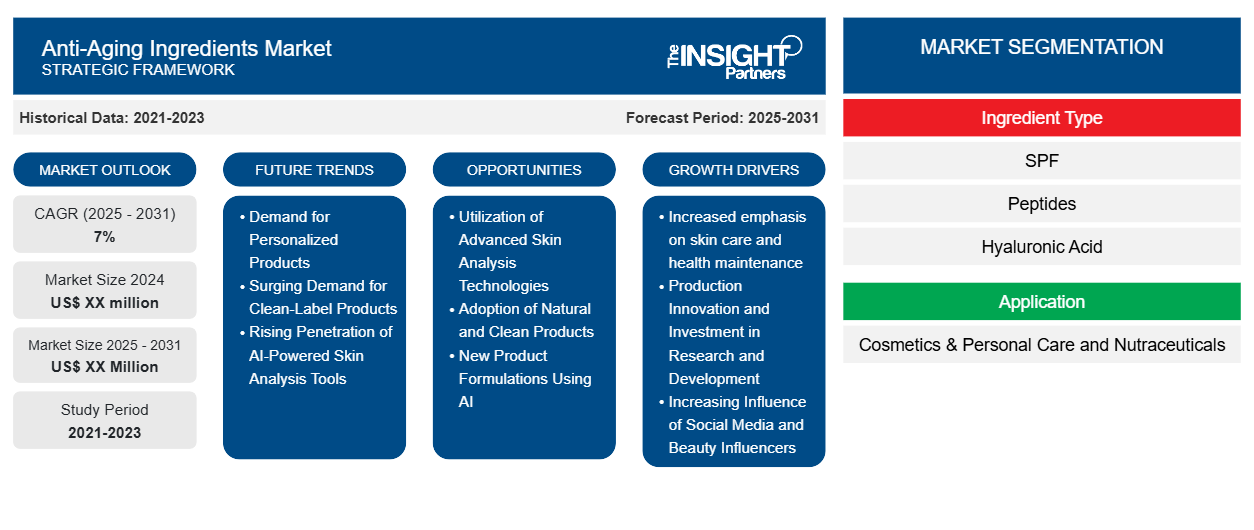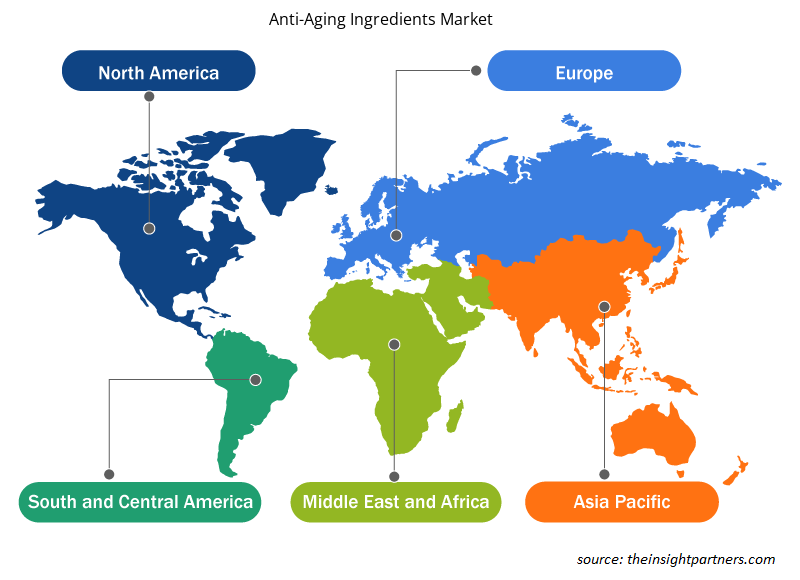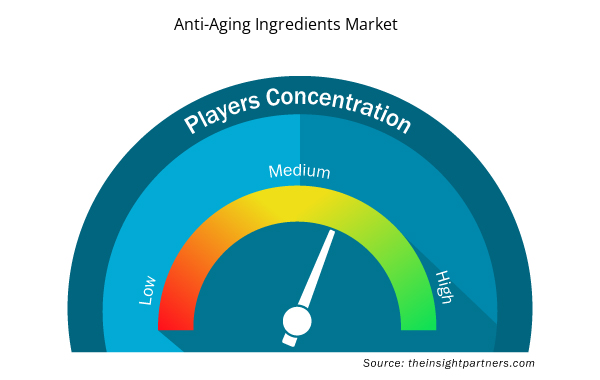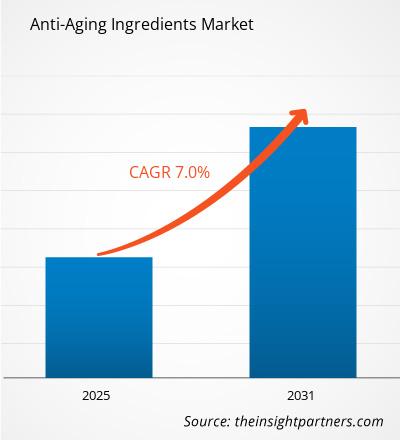The Anti-Aging Ingredients Market is expected to register a CAGR of 7% from 2025 to 2031, with a market size expanding from US$ XX million in 2024 to US$ XX Million by 2031.
The report is segmented by Ingredient Type (SPF, Peptides, Hyaluronic Acid, Antioxidants, Retinol, Niacinamide, Ceramides, and Others). The global analysis is further broken-down at regional level and major countries. The report further presents analysis based on Application (Cosmetics & Personal Care and Nutraceuticals). The global analysis is further broken-down at regional level and major countries. The market size and forecast at global, regional, and country levels for all the key market segments are covered under the scope. The report offers the value in USD for the above analysis and segments. The report provides key statistics on the market status of the key market players and offers market trends and opportunities.
Purpose of the Report
The report Anti-Aging Ingredients Market by The Insight Partners aims to describe the present landscape and future growth, top driving factors, challenges, and opportunities. This will provide insights to various business stakeholders, such as:
- Technology Providers/Manufacturers: To understand the evolving market dynamics and know the potential growth opportunities, enabling them to make informed strategic decisions.
- Investors: To conduct a comprehensive trend analysis regarding the market growth rate, market financial projections, and opportunities that exist across the value chain.
- Regulatory bodies: To regulate policies and police activities in the market with the aim of minimizing abuse, preserving investor trust and confidence, and upholding the integrity and stability of the market.
Anti-Aging Ingredients Market Segmentation
Ingredient Type
- SPF
- Peptides
- Hyaluronic Acid
- Antioxidants
- Retinol
- Niacinamide
- Ceramides
- Others
Application
- Cosmetics & Personal Care and Nutraceuticals
Customize This Report To Suit Your Requirement
You will get customization on any report - free of charge - including parts of this report, or country-level analysis, Excel Data pack, as well as avail great offers and discounts for start-ups & universities
Anti-Aging Ingredients Market: Strategic Insights

- Get Top Key Market Trends of this report.This FREE sample will include data analysis, ranging from market trends to estimates and forecasts.
Anti-Aging Ingredients Market Growth Drivers
- Increased emphasis on skin care and health maintenance: Increased emphasis on skin care and health maintenance by customers is augmenting the use of anti-aging products. With the ever-evolving knowledge of physiology and the skin's aging process, preventive skin care measures are on demand, particularly among the young population, who wish to retard the aging process.
- Production Innovation and Investment in Research and Development: Innovations in R&D on the applications of various chemicals have resulted to lightening of laser technologies anti-aging emulsions. New technologies combine active ingredients, such as retinoids and peptides with antioxidants to improve their effectiveness. This kind of Innovations encourages consumers who are in search for results oriented products, thus driving the growth of the market.
- Increasing Influence of Social Media and Beauty Influencers: Customer preference is highly affected by social networks and beauty influencers. Due to the high demand for these products, the consumers are morefriendly to them and want an effective anti-aging solution including advanteged anti-aging active ingredients in beauty skin care products.
Anti-Aging Ingredients Market Future Trends
- Demand for Personalized Products: This is the age of personalized everything and one can imagine that this aspect will also influence the anti-aging ingredients market. With the growth of biotechnology and dermatological research, it will not only be possible to create a generic product but also special age reversal creams that will fit different skin types of different individuals.
- Surging Demand for Clean-Label Products: With people taking great care of their health, there is increasing concern towards the use of clean label anti-aging products. Jahar also emphasizes that this will see more companies committing to the use of organic and plant-based ingredients as it responds to the demand for safe and toxin-free skin care solutions which will factor in the future directional trajectory of the market.
- Rising Penetration of AI-Powered Skin Analysis Tools: It is expected that in this growing market, the use of technology, such as AI use for formulating products and skin analysis equipment, will highly benefit enabling the product development process in the anti-aging market. These technologies may be cost benefit for the brands wishing to develop sophisticated and advanced anti-aging products that will entice the modern day consumer who is keen on technology.
Anti-Aging Ingredients Market Opportunities
- Utilization of Advanced Skin Analysis Technologies: The increasing consumer preference for personalized skincare products presents a significant opportunity for the anti-aging ingredients market. Companies can leverage advanced technologies, such as skin analysis and genetic testing, to develop tailored formulations that meet individual needs, thereby enhancing customer satisfaction and loyalty.
- Adoption of Natural and Clean Products: As consumers become more health-conscious, there is a strong shift toward clean and natural beauty products. This trend offers an opportunity for anti-aging ingredient suppliers to focus on organic, sustainably sourced, and non-toxic formulations that appeal to environmentally aware consumers, opening up new market segments.
- New Product Formulations Using AI: The incorporation of technology, such as AI and machine learning, in product formulation and consumer engagement creates opportunities for innovation in the anti-aging ingredients market. Brands can develop effective, data-driven formulations while using technology for targeted marketing, enhancing their competitive advantage.
Anti-Aging Ingredients Market Regional Insights
The regional trends and factors influencing the Anti-Aging Ingredients Market throughout the forecast period have been thoroughly explained by the analysts at Insight Partners. This section also discusses Anti-Aging Ingredients Market segments and geography across North America, Europe, Asia Pacific, Middle East and Africa, and South and Central America.

- Get the Regional Specific Data for Anti-Aging Ingredients Market
Anti-Aging Ingredients Market Report Scope
| Report Attribute | Details |
|---|---|
| Market size in 2024 | US$ XX million |
| Market Size by 2031 | US$ XX Million |
| Global CAGR (2025 - 2031) | 7% |
| Historical Data | 2021-2023 |
| Forecast period | 2025-2031 |
| Segments Covered |
By Ingredient Type
|
| Regions and Countries Covered | North America
|
| Market leaders and key company profiles |
Anti-Aging Ingredients Market Players Density: Understanding Its Impact on Business Dynamics
The Anti-Aging Ingredients Market market is growing rapidly, driven by increasing end-user demand due to factors such as evolving consumer preferences, technological advancements, and greater awareness of the product's benefits. As demand rises, businesses are expanding their offerings, innovating to meet consumer needs, and capitalizing on emerging trends, which further fuels market growth.
Market players density refers to the distribution of firms or companies operating within a particular market or industry. It indicates how many competitors (market players) are present in a given market space relative to its size or total market value.
Major Companies operating in the Anti-Aging Ingredients Market are:
- Adeka Corporation
- Contipro Inc
- Beiersdorf AG
- BioThrive Sciences
- Kao Corporation
- Shiseido
Disclaimer: The companies listed above are not ranked in any particular order.

- Get the Anti-Aging Ingredients Market top key players overview
Key Selling Points
- Comprehensive Coverage: The report comprehensively covers the analysis of products, services, types, and end users of the Anti-Aging Ingredients Market, providing a holistic landscape.
- Expert Analysis: The report is compiled based on the in-depth understanding of industry experts and analysts.
- Up-to-date Information: The report assures business relevance due to its coverage of recent information and data trends.
- Customization Options: This report can be customized to cater to specific client requirements and suit the business strategies aptly.
The research report on the Anti-Aging Ingredients Market can, therefore, help spearhead the trail of decoding and understanding the industry scenario and growth prospects. Although there can be a few valid concerns, the overall benefits of this report tend to outweigh the disadvantages.
- Historical Analysis (2 Years), Base Year, Forecast (7 Years) with CAGR
- PEST and SWOT Analysis
- Market Size Value / Volume - Global, Regional, Country
- Industry and Competitive Landscape
- Excel Dataset



Report Coverage
Revenue forecast, Company Analysis, Industry landscape, Growth factors, and Trends

Segment Covered
This text is related
to segments covered.

Regional Scope
North America, Europe, Asia Pacific, Middle East & Africa, South & Central America

Country Scope
This text is related
to country scope.
Frequently Asked Questions
Rise of personalized skincare is expected to be the key market trends
Based on ingredient type, the hyaluronic acid segment is expected to witness the fastest growth during the forecast period
Based on geography, Asia Pacific held the largest share of the anti-aging ingredients market due to the growing concerns regarding anti-aging across the region, coupled with continuous urbanization
The Anti-Aging Ingredients Market is estimated to witness a CAGR of 7% from 2023 to 2031
Rising awareness of skin health is driving the market growth
BASF SE; Evonik Industries; DSM; Croda International; Ashland Global; Lonza Group; Givaudan; Symrise AG; Clariant AG; Seppic; Merck KGaA; Nexira; Vantage Specialty Chemicals; Gattefossé; Lucas Meyer Cosmetics

 Get Free Sample For
Get Free Sample For